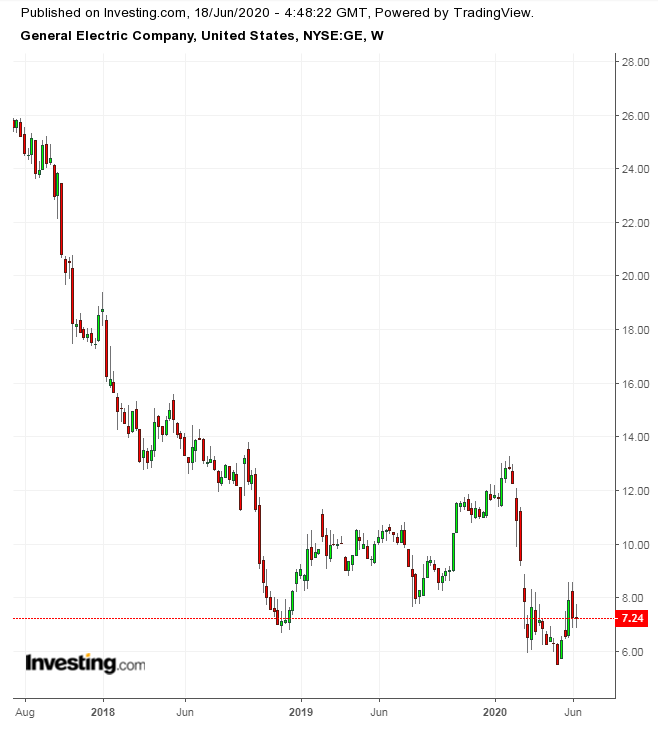The global health crisis has ensnared General Electric (NYSE:GE) in a perfect storm of marketplace risks. Demand for its products and services has plunged. The company's stock is down 35% this year alone, with gains made over the past 18 months having almost completely evaporated.

One of the biggest setbacks for GE’s turnaround is coming from its aviation division, which makes jet engines for Boeing (NYSE:BA) and Airbus (OTC:EADSF). Until now, that segment had been generating positive cash flows for the Boston-based industrial conglomerate. But, since the health crisis forced governments around the world to put their citizens in lockdowns, essentially halting travel, airlines have grounded their fleets, causing GE to furlough half its U.S. aviation-manufacturing workers and lay off about 10% of its U.S. jet-engine workforce.
The current severe slump in GE shares, which had staged an impressive return in 2019, reflects investor concerns about the industrial giant’s ability to survive one of the toughest economic recessions of our time.
Before the COVID-19 pandemic, analysts on The Street were turning more positive about the company’s revival. GE’s CEO Larry Culp was restructuring its operations, trying to pull the company out of a downturn caused by weak demand for its power generation equipment as well as troubles within its GE Capital unit.
The drop in its stock's value, which started in 2017 and wiped out about $200 billion in equity, forced the company to slash its quarterly dividend to a token penny per share. To raise cash and pay down debt, GE also sold assets and exited from its transportation and oil businesses.
More Pain Ahead
Since global travel came to a stop in March, GE’s aviation business saw revenue drop by 13% in the first quarter, with profit in the division tumbling 39%.
The second quarter will be the first full quarter to show pressure from COVID-19. GE expects its financial results will decline sequentially. JPMorgan’s Stephen Tusa, who has a neutral rating on the stock, said in a recent note to clients that GE’s free cash flow is likely materially negative this year.
“This is a worse than expected result, visibility on how bad this could be is still evolving, and all the mechanisms that this company had continued to use in 2019 as a crutch for industrial results are becoming unmasked,” Tusa said.
GE also faces rising retirement benefit costs. Falling interest rates are taking a toll on the company's pension plan which will likely require another $10 billion investment, if not more, according to John Inch, an analyst at Gordon Haskett. In addition, the value of GE's 36.8% stake in oil giant Baker Hughes (NYSE:BKR) has further eroded as energy prices have weakened.
Silver Lining
However, amid all this turmoil, management sees a silver lining. The crisis triggered by the coronavirus outbreak may even accelerate the cost-cutting efforts and cultural changes the company has been trying to make, CEO Culp said in an interview with Bloomberg.
Management has planned cost cuts of more than $2 billion, along with $3 billion in cash preservation to cushion the coronavirus blow. It’s also expediting internal changes needed to give the company a fresh start.
This week, GE announced that the long-time CEO of its aviation unit, David Joyce, was stepping down and would be replaced by John Slattery, formerly head of commercial aviation at Brazilian planemaker Embraer (NYSE:ERJ).
To strengthen its cash position, GE has also been active in debt markets; the company's finance arm has sold more than $13.5 billion in bonds since mid-April. General Electric has also raised about $20 billion through the sale of its biopharma business, a deal that closed at the end of March.
Via these measures, GE now has cash and cash-equivalent holdings topping more than $47 billion, along with a revolving debt facility of $15 billion to ride out the virus-induced downturn.
Bottom Line
Last year, GE came very close to turning the corner due to its turnaround efforts. Unfortunately, the deep recession the US, and the world, finds itself in has complicated the situation, resulting in deeper uncertainty for GE.
Though General Electric seems to have enough cash to get it through this tough period, investors shouldn’t expect more than survival in this environment.
